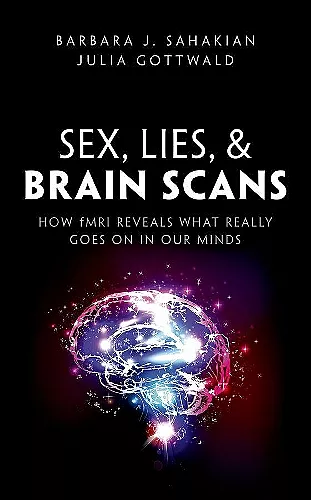Sex, Lies, and Brain Scans
How fMRI reveals what really goes on in our minds
Barbara J Sahakian author Julia Gottwald author
Format:Paperback
Publisher:Oxford University Press
Published:28th Nov '19
Should be back in stock very soon
This paperback is available in another edition too:
- Hardback£19.99(9780198752882)

Winner of the British Psychological Society Book Award for Popular Science
The potential of fMRI is extraordinary. It allows us to observe brain activity in real time, build an understanding of thoughts and motivations, and discern unconscious biases. Barbara J. Sahakian and Julia Gottwald explain the science, and consider the ethical implications of using these techniques.The recent explosion of neuroscience techniques has proved to be game changing in terms of understanding the healthy brain, and in the development of neuropsychiatric treatments. One of the key techniques available to us is functional magnetic resonance imaging (fMRI), which allows us to examine the human brain non-invasively, and observe brain activity in real time. Through fMRI, we are beginning to build a deeper understanding of our thoughts, motivations, and behaviours. Recent reports that some patients who have all indications of being in a persistent vegetative state actually show conscious awareness, and were able to communicate with researchers, demonstrate perhaps the most remarkable and dramatic use of fMRI. But this is just the most striking of a number of areas in which fMRI is being used to 'read minds', albeit in a very limited way. As neuroscientists unravel the regions of the brain involved in reward and motivation, and in romantic love, we are likely to develop the capacity to influence responses such as love using drugs. fMRI studies have also been used to indicate that many people who would not regard themselves as racist show a racial bias in their emotional responses to faces of another racial group. Meanwhile, the reliability of fMRI as a lie detector in murder cases is being debated - what if the individual simply believes, falsely, that he or she committed a murder? Sex, Lies, and Brain Scans takes readers beyond the media headlines. Barbara J. Sahakian and Julia Gottwald consider what the technique of fMRI entails, and what information it can give us, showing which applications are possible today, and which ones are science fiction. They also consider the important ethical questions these techniques raise. Should individuals applying for jobs as teachers or judges be screened for unconscious racial bias? What if the manipulation of love using 'love potions' was misused for economic or military ends? How far will we allow neuroscience to go? It is time to make up our minds.
This is a fascinating guide to neuroimaging and the wonders of one of the most complex structures in the universe: our brain. * PD Smith, The Guardian *
A valuable primer on what fMRI can and cannot tell us, at least at the moment. * Julian Baggini, The Financial Times *
Rich coverage of behavioural research. * Russell Poldrack, Nature *
The authors highlight ethical issues that should be of interest to all of us. * Psychology Today *
This concise, engaging tome begins by explaining the science behind fMRI technology to a non-specialist readership. The studies that follow are compelling. * Emmanuelle Smith, Therapy Today *
Once picked up, this book is not easy to put down... it provides an important introduction to breakthroughs emerging from neuroimaging for people who are wondering what all the recent fuss regarding the brain is all about. * Professor John Krystal, MD, Yale University *
- Winner of Winner of the British Psychological Society Book Award for Popular Science.
ISBN: 9780198752899
Dimensions: 95mm x 124mm x 10mm
Weight: 142g
176 pages